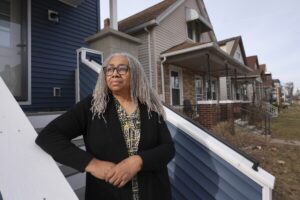Data analysis by THE CITY shows that certain NYPD precincts have a higher proportion of inexperienced new police officers than others — and that officers tend to receive more complaints at the early stages of their careers.
Rookies in any field getting stuck with the toughest assignments is nothing new. But when it comes to police work, freshly minted officers are thrown directly into some of New York’s roughest neighborhoods, widening the potential for serious mistakes, data shows.
Two decades ago, the NYPD set the policy of giving rookies a tough start in an effort to “flood” high-crime areas with officers. Operation Impact, launched in January 2003, sent academy graduates to the city’s “impact zones,” alongside specialized personnel such as those in narcotics and gangs divisions.
By 2008, an NYPD report said that the policy brought about reductions in crime and that its “initial and continued success has been remarkable.” But in 2014, then-Police Commissioner Bill Bratton called for reform to the policy, with new officers first being assigned to inside-precinct work under greater supervision from seasoned officers — saving high-crime street beats for later.
The NYPD did not respond when asked by THE CITY if Operation Impact — or a similar policy — is still in effect. The 2008 report, however, acknowledged that the tactic’s “most salient requirement is manpower,” which the department, like the rest ofthe city, is now said to be lacking.
Whatever the official policy is now, THE CITY’s analysis of NYPD data found that many precincts that registered double-digit increases in reported crimes, including felonies, between 2019 and 2022, had a higher-than-average share of new officers.
To analyze the distribution of newer police officers across NYPD precincts, THE CITY examined publicly available records on about 19,637 active police officers. Out of the 2,258 police officers hired in 2021, the department’s officer profile data shows that 1,770 were assigned to patrol in precincts, while the remaining 488 were sent to other units, such as transit and housing bureaus.
The distribution of these officers wasn’t uniform; some precincts, such as The Bronx’s 40th (Port Morris, Mott Haven, and Melrose) and 44th (Grand Concourse, Bronx Terminal Market, and Yankee Stadium), received a larger share of this new contingent.
Citywide, about 16% of patrol cops are newbies. However, in some precincts, the share of rookie cops is double that.
For instance, one-third of the police officers in Manhattan’s 7th Precinct, which covers the Lower East Side and where the number of reported crimes rose by 52% between 2019 and 2022, were hired in 2021. Half of the 90 police officers there have spent less than 3.8 years in the force.
In Brooklyn’s 72nd Precinct, which covers Sunset Park and Windsor Terrace, 30% of the police officers are rookies. The number of felonies reported in the area increased by 32% from 2019 to 2022, data shows.
The 41st Precinct in The Bronx received a fresh batch of 29 recruits in 2021, now accounting for 22% of its officers. Felony complaints were up 44% in 2022, compared to 2019. The 110th Precinct in Queens, encompassing Elmhurst and Corona, has 32 police officers with fewer than two years of experience, or 21% of its total. The precinct has recorded a 67% jump in felonies since 2019.
Meanwhile, a separate analysis by THE CITY of more than 100,000 police misconduct complaints published by the Civilian Complaint Review Board shows that a significant proportion of complaints are filed about incidents that occur early in officers’ careers.
Felipe Rodriguez, an adjunct professor at John Jay College of Criminal Justice who spent 10 years in the NYPD, said that new officers are especially prone to making false arrests because they may misunderstand the legalities of the situation.
“Officers are thrust into having to make fast-paced decisions without having supervising officers to help them at times,” Rodriguez said, also pointing to the fact that many cops are working a lot of overtime and “tired officers can’t make good decisions.”
Filling the Gap
NYPD officials did not give specifics to THE CITY about where and how new officers are placed, but said in an unsigned statement: “As officers graduate the academy they are assigned to Precincts, Public Service Areas and Transit Districts citywide based upon current crime trends and personnel needs of the department.”
Those graduates are being deployed at the same time that the NYPD is losing experienced officers at a rapid rate. According to a statement on the Police Benevolent Association website: “In 2022, the NYPD lost 3,701 members to resignation or retirement, the highest attrition the Department has experienced in 20 years. The 1,746 NYPD members who resigned before becoming eligible for their full pension was the highest number on record.”
PBA President Patrick J. Lynch said in an email to THE CITY that there are “absolutely not” enough rookies to replace those who are retiring or resigning.
As the union tweeted on Jan. 17, “We needed +1,200 new recruits to reach the current budgeted headcount, or 2,500 to get back to 2019 staffing levels. We got 543.”
Lynch also pointed to a kind of brain drain compounding the problem: “Even if the department was able to fill its Academy classes, we are losing too many of the experienced cops who know their communities best.”
According to a PBA spokesperson, department attrition was “historically driven by retirement,” but now, officers “in the prime of their careers quit to find better pay, better benefits and better working conditions elsewhere.”
This statement was no surprise to Rodriguez, of John Jay. “I’ve done policing for 31 years, and this is one of the worst situations I’ve ever seen,” he said in a phone interview with THE CITY. “The worst part is, the public is not being serviced properly, and the whole society is suffering.”
Rodriguez said that NYPD members are finding better options near and far: “You’re talking about officers who are just fleeing the NYPD as a department and going to MTA, going to Florida, where they’re offering bonuses and everything else.”
Under the newly-approved NYPD contract, starting base pay increased from $42,500 to $53,790. While the starting salaries are comparable for police for the MTA and Nassau and Suffolk counties, city officers often go to these areas seeking stronger support, more pay in the long run, and less stress.
And the starting salary at the Yonkers Police Department is over $72,000, rising to $100K after five years, according to their website. Elsewhere in the country, smaller cities like Aurora, Colorado are luring NYPD officers with high pay, signing bonuses, and the perception, at least, of less demanding conditions.
“Before, [policing] was seen as an honorable profession, and people wanted to get their pensions,” Rodriguez said. “Now they come to the NYPD, they’re trained, they spend all this money on training them, and what we do is give other police departments good cops.”
Rodriguez said that having lots of rookies and fewer experienced officers in general makes for a “horrible situation.”
“They will not be prepared,” he said. “Scenarios will only train you so much. You have to live it, you have to do it.”
He worried that new officers are a liability to the department and the community, saying, “Rookie mistakes can result in a lawsuit, or even worse. If we impact the community to where people are now even more angry, or they’re not happy with the quality of policing, and instead of maybe one day calling 911 when a police officer’s in trouble, they’d rather say, ‘You know what, he deserves it,’ and look the other way.”
While no one has blamed their inexperience for the incident, a partnered pair of rookie cops were involved in a shootout in Jamaica, Queens in early April that sent one of them to the hospital with a bullet wound in his leg. In one of the city’s deadliest neighborhoods, beginner cops got into a tough situation that escalated quickly.
Community Engagement
Rodriguez said neighborhood policing — walking the streets and engaging with residents — is critical to improving relationships. But he said the department is stretched too thin to do more of that.
“We gotta get these cops out of the cars,” he said. “Our community ties are stronger than anything, so if we don’t get these cops out of the car, if we don’t try to get the neighborhood coordination officers dealing with the people and getting to know people, we’re gonna have big problems — especially with these young cops.”
Another concern is a lack of so-called soft skills or interpersonal communication prowess among newer officers.
“They’ve grown up texting and using social media as their primary means of communication,” said Chris Magnus, senior advisor for the Policing Project, an NYU School of Law initiative focusing on police accountability. “And, you know, a lot of them, they really need practice and support in terms of learning how to talk to people and convincing people to cooperate and how to de-escalate situations.”
Magnus himself is a 43-year veteran of police departments across the country, including about 10 years as chief of police in Richmond, Calif., a community that he said “hated the police” and had high homicide and gang activity rates when he started in 2006.
Working there led Magnus to fully embrace community engagement as integral to police work, as he saw it produce positive results over time, including decreased murder rates, he said.
Magnus described new officers as “malleable,” and said that they need to learn the right social skills early. “If they think their job is just to handle calls for service or take a very stoic, sort of hardened position and kind of an ‘Us-versus-Them’ mentality, and really not be able and willing to talk to people, you know, the clay starts to harden,” he said.
Thrown to the Wolves?
The 7th Precinct on the Lower East Side is the city’s “second smallest” at just more than half of a square mile, according to its website. The area sees a lot of foot traffic from bars, restaurants, and nightlife.
In this precinct, one-third of its police officers were hired after 2020, making it the city’s most highly-concentrated area of newbies.
Sitting on an outdoor bench near the precinct, a lifelong Lower East Side resident with three teens and an adult child told THE CITY, “I was here before it was cool.”
Decades ago, she said, there were many community officers who “knew kids by name.” Now, she said, “My children of color do not look to the police for help.”
“I’ve always been a proponent of neighborhood policing,” she said, “but the definition has changed over the years.” Citing societal ills like poverty and drug addiction, she said, “I think there was a push to criminalize people.”
An employee at a nearby bicycle shop, who noted his general dislike of cops and his wish to have officers “looking after” neighborhoods they live in rather than patrolling someone else’s neighborhood, said that placing new officers in the 7th Precinct seems “kinda silly, like throwing them to the wolves,” because the bustling neighborhood can be overwhelming to someone not accustomed to it.
But, he added, “I’m not sure a slower entry would make them more empathetic.”




